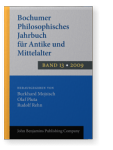Der Begriff der inneren Erfahrung bei Petrus Johannis Olivi
The concept of inner experience in Peter John Olivi. This article discusses the notion of inner experience and self-knowledge in Peter John Olivi. According to Olivi, each act of cognition is accompanied by some sort of self-awareness or self-experience. Therefore, the problem of an infinite regress of acts of self-awareness arises. Olivi tries to solve this problem by drawing on a theory of reflection which bears a striking resemblance to modern self-representational or dispositional accounts of (self)consciousness. Thus, in order to be said to be »known« or »certain« it is not necessary for each single act of intellect to be followed by a higher-order act; Olivi argues that in many cases a simple first-order cognitive act suffices.
Article language: German
Cited by (3)
Cited by three other publications
Schierbaum, Sonja
2016.
Subjective Experience and Self-Knowledge: Chatton’s Approach and Its Problems. In
Subjectivity and Selfhood in Medieval and Early Modern Philosophy [
Studies in the History of Philosophy of Mind, 16],
► pp. 143 ff.

Silva, José Filipe
2016.
Self-Awareness and Perception in Augustinian Epistemology. In
Subjectivity and Selfhood in Medieval and Early Modern Philosophy [
Studies in the History of Philosophy of Mind, 16],
► pp. 157 ff.

Sang-Sup Lee
2010.
Thomas Aquinas vs. Petrus Johannes Olivi on Self-Knowledge.
Hegel-Studien (Hegel-Yeongu) null:28
► pp. 499 ff.

This list is based on CrossRef data as of 31 july 2024. Please note that it may not be complete. Sources presented here have been supplied by the respective publishers.
Any errors therein should be reported to them.
